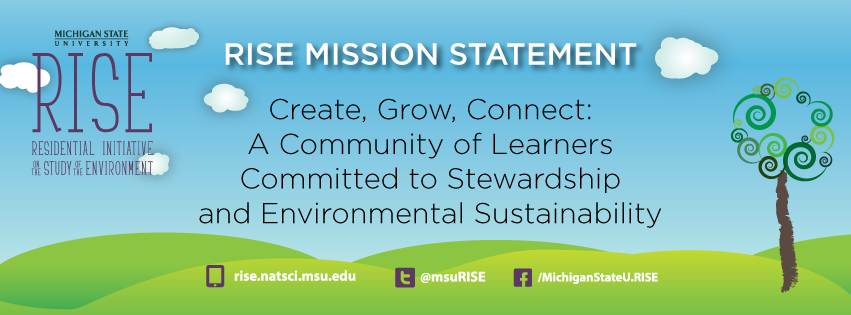Our Mission, Values, Learning Outcomes
About RISE
RISE may be conceptualized as an interdisciplinary living-learning community for undergraduates at Michigan State University who share a common interest in environmental sustainability. Student participants come to RISE majoring in a variety of disciplines spanning seven different colleges at MSU (see Participating Colleges at right). Below we have articulated a mission statement, learning outcomes, RISE core values, and specific goals and priorities.

Learning Outcomes
After participating in the RISE Living-Learning Community, students will be able to:
-
Demonstrate Leadership: Describe and practice leadership skills through communication, facilitating team processes, and decision making.
-
Create Community: Demonstrate the skills necessary to develop a set of community values and practices that cultivate an ethic of care.
-
Understanding Place-making: Through place-based learning students will understand the complex relationships in the MSU ecosystem.
-
Collaborate Effectively: Seek and value collaboration with others from diverse backgrounds and academic disciplines.
-
Engage in Sustainability Work: Apply concepts of sustainability to our campus and community by experiential learning.
RISE Core Values
Authenticity | RISE provides an atmosphere where all can be true to their personality, values,
and spirit, regardless of the outside pressures to act otherwise. We recognize the
path of personal development is grounded in living authentically, cultivating honesty
with ourselves, taking responsibility for mistakes, and creating alignment with values
and actions.
Community | RISE is a living learning community of people who recognize our interdependence
on each other and the biosphere. Healthy relationships are essential to human and
planetary flourishing. We develop effective and caring teams in support of the larger
community goals and learning outcomes.
Innovation | RISE fosters a safe environment where innovation, creativity and exploration occurs.
Sometimes we fail, but this is seen as a part of a larger learning process.
Happiness | RISE creates opportunities to feel a sense of contentment about one’s self, life,
and place in the world. We recognize happiness as an essential outgrowth of a life
well lived.
Respect | RISE promotes access, advocacy, and support for ALL members of the community. We
foster connection and openness among students of varying viewpoints and backgrounds
while recognizing and addressing issues of inequity and oppression so all can engage,
connect and experience success.
Stewardship | RISE contributes to the well being of the people and planet through service. We
cultivate a network of care and support for the planet, our community, and each other.
Wisdom | In RISE, we grow in understanding of ourselves, our life calling and real purpose.
We co-construct, think critically, and share knowledge and learning opportunities
for the betterment of individuals, the community, and the world. With knowledge comes
responsibility for ethical action.
Goals and Priorities
Goals and priorities of the RISE Program and the Minor in Environmental Studies are as follows:
- Enhance the undergraduate experience by providing a living-learning community that supports academic success. Key components of this support system include personalized advising, mentoring, access to resources, and career planning.
- Enrich community, economic, and family life through undergraduate involvement in environmental outreach and engagement
- Increase research opportunities for undergraduates by sustaining a RISE network of faculty engaged in environmental scholarly activities, using RISE funds to support undergraduate research and travel to professional meetings
- Strengthen stewardship by supporting the utilization of the MSU campus as a dynamic learning laboratory for environmental stewardship, mentoring and guiding undergraduate projects and research
For historical context, when the program was initially established in 1995, the goals (as stated in the Academic Programs Catalogue) were:
- Provide knowledge essential for understanding the physical environment that is inhabited and influenced by humans.
- Explain the way in which direct and indirect policy making by social, economic, and political institutions affects environmental issues.